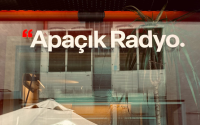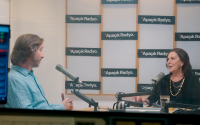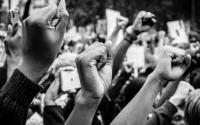25 April 2004The Observer
A series of explosions ripped through one of Iraq's main oil facilities yesterday in one of the most daring attacks by local insurgents or Islamic militants to date. Two coalition sailors were killed.
The strikes mark a devastating new phase in resistance in the country.
The explosions also came on one the worst days of violence since the war with at least 40 people killed and scores wounded in strikes elsewhere.
The two sailors were killed when they tried to intercept a small boat sighted near the al-Baqra oil terminal, seven miles off the southern coast of Iraq.
As their patrol vessel approached, the boat exploded, throwing the crew into the water. A second vessel was said to have exploded 'at a facility' almost immediately afterwards. There were also reports of a third blast.
Al-Qaeda and related terror groups have used boats to devastating effect before. In October 2002 an American destroyer was badly damaged by a speedboat laden with explosives.
The explosions may be part of a sustained campaign targeting, for the first time, the British controlled south of Iraq. Last week a series of suicide bombs killed 80 people in Basra. Strikes on the oil facilities, seen as crucial to the reconstruction of Iraq, would be a devastating blow to coalition attempts to end mounting chaos in the country before the transfer to Iraqi sovereignty.
Elsewhere, in the most horrific attack yesterday, mortars exploded in the crowded poultry market in the Sadr City area of Baghdad, killing at least 13 people and wounding 30 more.
Elsewhere four Iraqi civilians died in a suicide bombing of an American base in Tikrit, Saddam Hussein's home town, and four American soldiers were killed by rockets at their base in Taji near the capital.
American officials also said that five Iraqis had been killed in a gun battle in the central shrine city of Kerbala, the stronghold of firebrand cleric Muqtada al-Sadr, after they attacked a coalition base early on Saturday and an American infantryman was killed by a roadside bomb.
Three mortars hit the market in Sadr City, a poverty-stricken Shia area that is largely controlled by extremist cleric Muqtada al-Sadr, at around 11am. Al Sadr has led a rebellion against the US-led coalition authorities who have sworn to kill or capture him.
Local people have been angered by protracted skirmishing between al-Sadr's Mahdi army militia and American troops in recent weeks. Fierce gun battles raged again early on Saturday morning in which at least one civilian was killed and several more injured.
Yesterday armed men from this militia, who have established a stronghold in the district's narrow streets, manned checkpoints preventing access to the site of the mortar attack.
Witnesses described the scene as carnage.
'The market was very crowded. There was a huge bang and I closed my eyes and when I opened them my legs were on fire,' Ayid Hussein Ismael, 30, told The Observer.
'People were running everywhere and I saw lots of people on the ground. Some people helped me and put sand on my legs to put the fire out and took me to hospital.'
Angry residents held up bloodied human remains to television cameras filming the scene, accusing U.S. helicopters of firing missiles at the market. A dead donkey lay on the road, its guts spilled. Local residents put a sign on its back saying: 'This is Bush.'
One of the mortars had struck a gas canister which had then exploded, one witness said.
At the Shaheed al-Sadr hospital nearby, relatives of the dead and wounded sat on the ground weeping.
'This Bush, we don't want him,' one woman cried. 'It wasn't like this under Saddam Hussein.'
The strikes are likely to be the work of the largely Sunni Muslim insurgents who have been behind the bulk of attacks in Iraq in recent months. Makeshift mortars and rockets target the 'green zone' in central Baghdad, where the US-led coalition has its administrative headquarters almost every day.
Hotels where many journalists and contractors are based have also been hit. However it is unclear why anyone would target purely civilian areas of Sadr City. The suicide bombings in Basra last week were aimed at police stations.
After the Basra attacks angry crowds of al-Sadr supporters took to the streets to accuse Britain and American of organising the bombings. Iraqi insurgents may be hoping further strikes turn the majority Shia community against the occupying authorities .
Another day ... and the death toll mounts
Three boats attack Iraq's main oil terminal offshore in the Gulf.
US marines kill around 30 Iraqi insurgents overnight in a firefight near Falluja.
Thirteen Iraqis killed and 30 wounded when mortar bombs explode in Baghdad market.
Roadside bomb kills 14 Iraqis travelling by bus to Baghdad, and wounds 12.
Five American soldiers killed and six wounded when insurgents fire rockets into base near Taji, north of Baghdad.
In Saddam Hussein's home town of Tikrit, a car bomb kills three policemen and wounds another 16 people.
Polish soldiers kill five Iraqi gunmen who opened fire on their patrol in Kerbala.
Suicide boats attack Iraq oil port
A series of explosions ripped through one of Iraq's main oil facilities yesterday in one of the most daring attacks by local insurgents or Islamic militants to date. Two coalition sailors were killed.
The strikes mark a devastating new phase in resistance in the country.
The explosions also came on one the worst days of violence since the war with at least 40 people killed and scores wounded in strikes elsewhere.
The two sailors were killed when they tried to intercept a small boat sighted near the al-Baqra oil terminal, seven miles off the southern coast of Iraq.
As their patrol vessel approached, the boat exploded, throwing the crew into the water. A second vessel was said to have exploded 'at a facility' almost immediately afterwards. There were also reports of a third blast.
Al-Qaeda and related terror groups have used boats to devastating effect before. In October 2002 an American destroyer was badly damaged by a speedboat laden with explosives.
The explosions may be part of a sustained campaign targeting, for the first time, the British controlled south of Iraq. Last week a series of suicide bombs killed 80 people in Basra. Strikes on the oil facilities, seen as crucial to the reconstruction of Iraq, would be a devastating blow to coalition attempts to end mounting chaos in the country before the transfer to Iraqi sovereignty.
Elsewhere, in the most horrific attack yesterday, mortars exploded in the crowded poultry market in the Sadr City area of Baghdad, killing at least 13 people and wounding 30 more.
Elsewhere four Iraqi civilians died in a suicide bombing of an American base in Tikrit, Saddam Hussein's home town, and four American soldiers were killed by rockets at their base in Taji near the capital.
American officials also said that five Iraqis had been killed in a gun battle in the central shrine city of Kerbala, the stronghold of firebrand cleric Muqtada al-Sadr, after they attacked a coalition base early on Saturday and an American infantryman was killed by a roadside bomb.
Three mortars hit the market in Sadr City, a poverty- stricken Shia area that is largely controlled by extremist cleric Muqtada al-Sadr, at around 11am. Al Sadr has led a rebellion against the US-led coalition authorities who have sworn to kill or capture him.
Local people have been angered by protracted skirmishing between al-Sadr's Mahdi army militia and American troops in recent weeks. Fierce gun battles raged again early on Saturday morning in which at least one civilian was killed and several more injured.
Yesterday armed men from this militia, who have established a stronghold in the district's narrow streets, manned checkpoints preventing access to the site of the mortar attack.
Witnesses described the scene as carnage.
'The market was very crowded. There was a huge bang and I closed my eyes and when I opened them my legs were on fire,' Ayid Hussein Ismael, 30, told The Observer .
'People were running everywhere and I saw lots of people on the ground. Some people helped me and put sand on my legs to put the fire out and took me to hospital.'
Angry residents held up bloodied human remains to television cameras filming the scene, accusing U.S. helicopters of firing missiles at the market. A dead donkey lay on the road, its guts spilled. Local residents put a sign on its back saying: 'This is Bush.'
One of the mortars had struck a gas canister which had then exploded, one witness said.
At the Shaheed al-Sadr hospital nearby, relatives of the dead and wounded sat on the ground weeping.
'This Bush, we don't want him,' one woman cried. 'It wasn't like this under Saddam Hussein.'
The strikes are likely to be the work of the largely Sunni Muslim insurgents who have been behind the bulk of attacks in Iraq in recent months. Makeshift mortars and rockets target the 'green zone' in central Baghdad, where the US-led coalition has its administrative headquarters almost every day.
Hotels where many journalists and contractors are based have also been hit. However it is unclear why anyone would target purely civilian areas of Sadr City. The suicide bombings in Basra last week were aimed at police stations.
After the Basra attacks angry crowds of al-Sadr supporters took to the streets to accuse Britain and American of organising the bombings. Iraqi insurgents may be hoping further strikes turn the majority Shia community against the occupying authorities .






